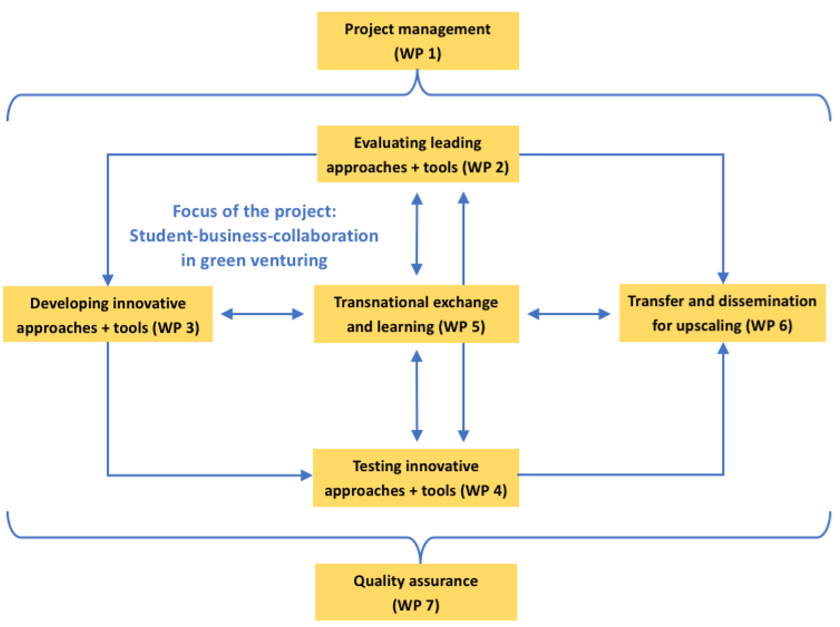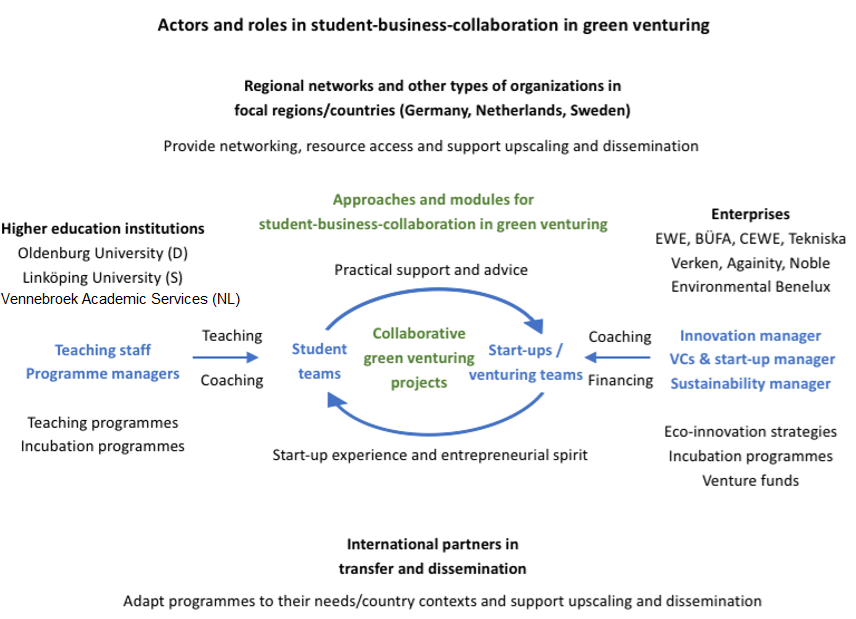Projects
Anyone starting a business or launching an innovative product has to consider a multitude of necessary steps: a business model, funding, market research – and many more. Environmentalism tends not to be on the books, at least not as a priority. S4S wants to change this shortcoming by introducing new forms of student-business collaboration in developing, implementing and scaling-up eco-innovations and starting new green businesses.
We call this activity „green venturing“. With “green” we refer to the concept of a Green Economy and the notion of a triple bottom line. S4S focuses on the collaboration of student teams and business partners in green venturing. S4S makes use of existing initiatives and schemes for collaborative green venturing of involved universities from Germany, Sweden and the Netherlands. Find out more about the various projects that are realized with S4S:
Aims and objectives
The objectives of the proposed project are:
- To evaluate the outputs and outcomes of collaborative green venturing and to identify key factors that make the flow of sustainable entrepreneurial knowledge and skills more effective
- To develop new, innovative approaches and tools to teaching and learning sustainable entrepreneurship and collaborative green venturing
- To stimulate sustainable entrepreneurship and green venturing skills of students, teaching staff as well as company staff
- To scale up and diffuse innovative approaches in collaborative green venturing at the involved HEIs and regions as well as across Europe
- To facilitate and boost the transnational exchange of knowledge and experiences with university-business collaboration in green venturing
- To disseminate good practices and knowledge in collaborative green venturing to provide a European added value

Target Groups

Students
The needs analysis of the involved HEIs is clearly indicating an increasing demand and interest by students to develop skills in green and sustainable entrepreneurship and in real problem-based interactive learning with business partners. Students, that have participated in collaborative green venturing activities, have developed their mind-sets and skills for sustainable entrepreneurship and have gained a realistic view of the opportunities and challenges to start new green ventures. This increases the chance that these students will become green entrepreneurs, create new jobs and innovative solutions to meet Sustainable Development Goals.

Teaching staff
Teaching offerings for sustainable entrepreneurship are still scarce. The S4S project will provide good practice examples how to successfully implement collaborative green venturing exercises in study programs of HEIs, will generate and test innovative approaches and tools for different university settings and will provide practical advice and toolkits to implement student-business collaboration in green venturing successfully and effectively.This way, S4S is not only boosting innovation, but also giving teaching staff and program managers a competitive edge in national and international contexts.

Innovation & sustainability managers
The involved full business partners as well as many other SMEs and large corporations in Europe are presently exploring or developing new structures and processes for open innovation and venturing programmes. Especially innovation managers, venturing managers and sustainability managers will benefit from the results of the S4S project, because it provides good practice examples and toolkits to implement interactive collaboration exercises with universities and student teams successfully.

Start-ups & corporate venturing teams
By screening and assessing innovative clean-tech solutions, market research, competitor analysis, developing elements of a business model or generating pitch-decks, student teams are supporting corporate venturing teams. This leads to concrete results (technology assessments, market reports, marketing strategy etc.) and practical benefits for the venturing and start-up teams. The support is free of charge and contributes to the acceleration of green venturing ideas and to making them more sustainable and robust.

Sustainability and impact
Regional level
On the regional level the involved HEIs and their respective regional business partners already have collaborated in the past and have a clear strategic interest of maintaining the developed collaboration approaches and knowledge exchange infrastructures. The S4S contributes to strengthening the regional university-business partnerships for boosting eco-innovation and starting new green ventures. This collaboration will reduce the failure rate of green venturing projects in the long term and simultaneously lead to an increase in economic and environmental success of venturing projects on a regional level.
Transnational level
On a transnational level the three involved HEIs plan to cooperate beyond project duration, e.g. through continuously participating in the international Internet platform “Sustainable Venturing Challenges” as collaboration partners. This platform allows to involve student teams from different countries in collaborative green venturing exercises. Furthermore, the three HEIs are planning to continue to evaluate their collaborative green venturing exercises on a regular basis. This will be based on the evaluation manual developed throughout S4S and will stir an ongoing discussion how to improve and scale up teaching and learning in regard to sustainable entrepreneurship and green venturing. Eventually, the scaling up and diffusion of eco-innovations will lead to the creation of jobs, the reduction of greenhouse gas emissions and other environmental benefits.

